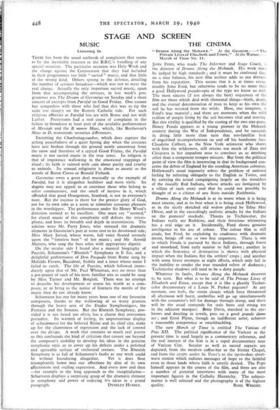STAGE AND SCREEN
MUSIC
Listening In
THERE has been the usual outbreak of complaints that seems to be the inevitable reaction to the B.B.C.'s handling of any special occasion. The particular occasion was Holy Week and the charge against the Corporation that they had included in their programmes too little " sacred " music, and that little of the wrong kind. Others sprang to the defence, detailing the number of services broadcast—which was not to meet the real charge. Actually the only important sacred music, apart from that accompanying the services, in last week's pro- grammes was The Dream of Gerontius on Sunday and a short concert of excerpts from Parsifal on Good Friday. One cannot but sympathise with those who feel that this was to tip the scale too sharply on the Roman Catholic side. For such religious affinities as Parsifal has are with Rome and not with Luther. Protestants had a real cause of complaint in the failure to broadcast at least part of the available performances of Messiah and the B minor Mass, which, like Beethoven's Mass in D, transcends sectarian differences.
Excepting the Charfreitagszauber, which does capture the aching peacefulness of a quiet Spring day when the crocuses have just broken through the ground newly uncovered from the snow. and therefore of a typical Good Friday, the Parsifal music is not sacred music in the true sense. Its religion is that of impotence wallowing in the emotional trappings of ritual ; its faith is tainted with cant about purity and cruelty to animals. Its sensual religiosity is about as ascetic as the novels of Baron Corvo or Ronald Firbank.
Gerontius owes a great deal musically to the example of Parsifal, but it is altogether healthier and more virile. Its dogma may not appeal to or convince those who belong to other communions, and the smell of incense in it, which offended that good Orangeman, Stanford, is not to everyone's taste. But the incense is there for the greater glory of God, not for its own sake as a scent to stimulate sensuous pleasure in the worshipper. The performance under Sir Henry Wood's direction seemed to be excellent. One must say " seemed," for choral music of this complexity still defeats the micro- phone, and loses its breadth and depth in transmission. The soloists were Mr. Parry Jones, who stressed the dramatic elements in Gerontius's part at some cost to its devotional side; Miss Mary Jarred, whose warm, full voice floated serenely upon the " timeless beat " of her music ; and Mr Arnold Matters, who sang the bass solos with appropriate dignity.
On the secular side I heard also a musical biography of Puccini, Schumann's " Rhenish " Symphony in E flat, and a delightful performance of Don Pasquale from Rome sung by Mafalda Favero, Baccaloni, Stabile and a tenor whose name I failed to catch. The life of Puccini, which followed imme- diately upon that of Mr. Paul Whiteman, was no more than a pot-pourri of such of his most familiar airs as could be sung by Miss Turner and Mr. Borgioli. There was no attempt to describe his development or assess his worth as a com- poser, or to bring to the notice of listeners the merits of the music they do not already know.
Schumann has not for many years been one of my favourite composers, thanks to the wallowing of so many pianists through the heavy seas of the Etudes Symphoniques, the Fantasia and the Sonatas. But the Rhenish Symphony, pro- vided it is not heard too often, has a charm that overcomes prejudice. Its warmth of feeling, its unpretentious display of schwiirmerei for the beloved Rhine and its chief city, make up for the clumsiness of expression and the lack of control over the design. A work that contains so much real poetry as this confounds the kind of criticism that cannot see beyond the composer's inability to develop his ideas in the genuine symphonic style or to cover up his defects under a polished and agreeable surface of orchestral texture. The Rhenish Symphony is as full of Schumann's faults as any work could be without foundering altogether. Yet it does float triumphantly home into our affections by dint of its own affectionate and smiling expression. And every now and then —for example in the long approach to the recapitulation— Schumann displays a surprising grasp of the dramatic element in symphony and power of ordering his ideas in a grand


































 Previous page
Previous page